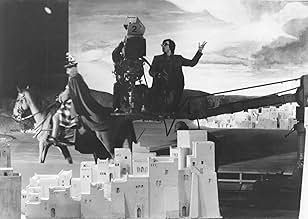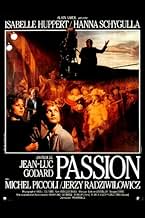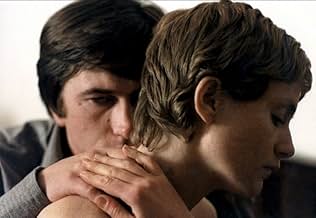A film director has an inspirational crisis while working on the production, Passion, and struggles with the nature of work and art.A film director has an inspirational crisis while working on the production, Passion, and struggles with the nature of work and art.A film director has an inspirational crisis while working on the production, Passion, and struggles with the nature of work and art.
- Director
- Writers
- Stars
- Awards
- 1 win & 5 nominations total
- Director
- Writers
- All cast & crew
- Production, box office & more at IMDbPro
Featured reviews
Despite the idiocy of the last comment there is an awful lot to be loved about Passion. The almost overstyled interiors of the studio set, complete with Painting Concrete (if you will) while the director and producer wander about discussing exactly how much per day it costs. Love it!
The narrative (yes it is there, just let your mind wander) is simple and familiar, the in jokes are hilarious, and the atmosphere, especially at the end scene with the ship in the forest is, at times, breath taking.
Yes it is dis-continuous, it is a film by JEAN-LUC GODARD! What do you expect. If you hate him, you'll hate this, if you love him, then this is destined to be one of your favourite JLG films (if you like his "mature" style that is).
The narrative (yes it is there, just let your mind wander) is simple and familiar, the in jokes are hilarious, and the atmosphere, especially at the end scene with the ship in the forest is, at times, breath taking.
Yes it is dis-continuous, it is a film by JEAN-LUC GODARD! What do you expect. If you hate him, you'll hate this, if you love him, then this is destined to be one of your favourite JLG films (if you like his "mature" style that is).
This is a good introduction to late-period Godard: all (ideological) passion spent, Oncle Jean is just going to show us a good time. Pretty girls lolling around the pool naked, glamourous stars like Hanna Schygulla with little to do, Isabelle Huppert when she could still play dewy-eyed ingenues, a ridiculous peplum being filmed by greedy, unscrupulous types (the director should have been played by Jacques Dutronc instead of that dour Polish actor).
It's 1982,these are the Thatcher-Reagan years, nobody thinks about Vietnam or the Palestinians or civil wars in Africa--people only want to make money. Godard gives us hip product-placement, Rembrandt, Caravaggio, Mozart instead of Coke or Pepsi.
It's 1982,these are the Thatcher-Reagan years, nobody thinks about Vietnam or the Palestinians or civil wars in Africa--people only want to make money. Godard gives us hip product-placement, Rembrandt, Caravaggio, Mozart instead of Coke or Pepsi.
After 13 years spent in the wilderness of Marxist cine-verite' political commentary, the infant terrible of the French New Wave movement Jean-Luc Godard made a much-touted return to mainstream film-making with SAUVE QUI PEUT (LA VIE) aka EVERY MAN FOR HIMSELF (in the U.S.) and SLOW MOTION (in the U.K.) and, for this occasion, the director chose to collaborate with eminent screenwriter Jean-Claude Carriere. The result is one of Godard's better latter-day works but, having now caught up with his successive work (apparently also featuring the uncredited hand of Carriere) PASSION, I find myself once again bewildered; while his next few films – FIRST NAME: CARMEN (1983), DETECTIVE (1985) and HAIL, MARY (1986) – once again show a marginal improvement, by all accounts he would again alienate much of his audiences with the remainder of his filmography, of which I am only familiar with the equally frustrating NOUVELLE VAGUE (1990).
Apart from the aforementioned Carriere, PASSION also reunited Godard with Raoul Coutard (although Vittorio Storaro had actually been his first choice) – director and cinematographer had not worked together since their 1960s heyday (more precisely on Godard's surreal road movie masterpiece WEEK-END {1967}) – as well as actors Isabelle Huppert (from SLOW MOTION, where she had played a prostitute) and Michel Piccoli (from CONTEMPT, where he had been a cuckolded screenwriter). The latter film would make a telling comparison with PASSION since they both deal with the world of international movie-making but, while the earlier example did not sacrifice entertainment value when expressing its intellectual integrity, the same cannot be said of the film under review! In fact, the film-within-a-film being shot here seeks, for no particular reason, to recreate some famous tableaux on celluloid underscored by an operatic soundtrack...but, never having been too much of a fan of paintings or opera, regarding them as highbrow artistic mediums, PASSION becomes a pretentious ride to nowhere (Poland notwithstanding)! Indeed, exiled Polish film-maker Jerzy Radziwilowicz decides to head back home at the very end and both Hanna Schygulla and Isabelle Huppert decide to join him on a whim.
The film's Polish director seems more interested in (and distracted by) the two stars (Schygulla plays a hotel owner who is factory owner Piccoli's mistress and Huppert a rebellious factory worker) than in getting anything shot; in a way, I can relate to his inertia since these past two weeks I have not gotten much 'work' done because of a trio of female friends I have been in contact with! Besides, Jerzy is forever complaining of the inadequacy of "Mr. Coutard"'s lighting; amusingly, everybody appearing in the film plays a character with a similar first name as the actor playing him! Ultimately, however, for all the film's intermittent (and frankly slight) amusements (Piccoli has an annoyingly consistent cough, a penchant for roses, and is made to dodge one persistent creditor throughout the film), the sheer fact that female 'actresses' on the set do nothing but pose and shed their clothing for gratuitous full-frontal nudity at times makes the film seem uncomfortably like a highbrow Tinto Brass effort or a lowbrow Peter Greenaway one!
The film was included in Lionsgate 3-Disc Set of Godard films along with FIRST NAME: CARMEN, DETECTIVE and OH, WOE IS ME (1993); like its predecessor, Godard shot a featurette on the making of his current film but, unfortunately, it has not been included in the enclosed supplements and this is one of the reasons why I opted to obtain the film from ulterior sources. Despite my reservations, PASSION was up for the Golden Palm at the Cannes Film Festival (where it competed against eventual co-winner Costa-Gavras' MISSING, Lindsay Anderson's BRITANNIA HOSPITAL, Werner Herzog's FITZCARRALDO, Wim Wenders' HAMMETT, Michelangelo Antonioni's IDENTIFICATION OF A WOMAN, Jerzy Skolimowski's MOONLIGHTING, The Taviani Brothers' THE NIGHT OF THE SHOOTING STARS {1981} and Ettore Scola's LA NUIT DE VARENNES and, ironically, won a prize for Coutard!) and nominated for a couple of Cesar awards (where it competed against the Carriere-scripted DANTON and THE RETURN OF MARTIN GUERRE!).
Apart from the aforementioned Carriere, PASSION also reunited Godard with Raoul Coutard (although Vittorio Storaro had actually been his first choice) – director and cinematographer had not worked together since their 1960s heyday (more precisely on Godard's surreal road movie masterpiece WEEK-END {1967}) – as well as actors Isabelle Huppert (from SLOW MOTION, where she had played a prostitute) and Michel Piccoli (from CONTEMPT, where he had been a cuckolded screenwriter). The latter film would make a telling comparison with PASSION since they both deal with the world of international movie-making but, while the earlier example did not sacrifice entertainment value when expressing its intellectual integrity, the same cannot be said of the film under review! In fact, the film-within-a-film being shot here seeks, for no particular reason, to recreate some famous tableaux on celluloid underscored by an operatic soundtrack...but, never having been too much of a fan of paintings or opera, regarding them as highbrow artistic mediums, PASSION becomes a pretentious ride to nowhere (Poland notwithstanding)! Indeed, exiled Polish film-maker Jerzy Radziwilowicz decides to head back home at the very end and both Hanna Schygulla and Isabelle Huppert decide to join him on a whim.
The film's Polish director seems more interested in (and distracted by) the two stars (Schygulla plays a hotel owner who is factory owner Piccoli's mistress and Huppert a rebellious factory worker) than in getting anything shot; in a way, I can relate to his inertia since these past two weeks I have not gotten much 'work' done because of a trio of female friends I have been in contact with! Besides, Jerzy is forever complaining of the inadequacy of "Mr. Coutard"'s lighting; amusingly, everybody appearing in the film plays a character with a similar first name as the actor playing him! Ultimately, however, for all the film's intermittent (and frankly slight) amusements (Piccoli has an annoyingly consistent cough, a penchant for roses, and is made to dodge one persistent creditor throughout the film), the sheer fact that female 'actresses' on the set do nothing but pose and shed their clothing for gratuitous full-frontal nudity at times makes the film seem uncomfortably like a highbrow Tinto Brass effort or a lowbrow Peter Greenaway one!
The film was included in Lionsgate 3-Disc Set of Godard films along with FIRST NAME: CARMEN, DETECTIVE and OH, WOE IS ME (1993); like its predecessor, Godard shot a featurette on the making of his current film but, unfortunately, it has not been included in the enclosed supplements and this is one of the reasons why I opted to obtain the film from ulterior sources. Despite my reservations, PASSION was up for the Golden Palm at the Cannes Film Festival (where it competed against eventual co-winner Costa-Gavras' MISSING, Lindsay Anderson's BRITANNIA HOSPITAL, Werner Herzog's FITZCARRALDO, Wim Wenders' HAMMETT, Michelangelo Antonioni's IDENTIFICATION OF A WOMAN, Jerzy Skolimowski's MOONLIGHTING, The Taviani Brothers' THE NIGHT OF THE SHOOTING STARS {1981} and Ettore Scola's LA NUIT DE VARENNES and, ironically, won a prize for Coutard!) and nominated for a couple of Cesar awards (where it competed against the Carriere-scripted DANTON and THE RETURN OF MARTIN GUERRE!).
It's not that I don't like arty films, I just found this so dreary. i can see why it may be of interest to a film-student, but to sit through it for entertainment purposes is certainly not recommendable! If you suffer from lack of sleep, check this out and it'll have you snoozing within no time at all. A christmas present for a friend you want to get rid of. In other words - pretentious crap.
Godard's 'Passion' will inevitably draw violent reactions from didactic viewers with a classical Hollywood outlook, even though it expressly addresses the contradictions and pains in discerning just what makes a film "a film". To condemn it as boring or shapeless is to blindly miss the point.
For those of us more inclined to tackle this fascinating question, there is much to luxuriate in here. From even a purely aesthetic viewpoint, the wonderfully incongruent images (like the ship in the forest) and the beautifully lit reconstructions of classical paintings (with their attendant outpourings of classical music) are enough to hold sway.
With these tools, Godard contrasts the passion and belief in labour; the practical against the artistic. Isabelle Huppert's stuttering, incoherent virgin loves her factory job and fights for her "right" to work, while the jaded director Jerzy, surrounded by a bevy of naked beauties during the making of his elusive film, sullenly stages his reconstructions. His work, however, contains no such solace and he becomes morose to the point of inertia by his task of creating a formally perfect but outwardly fragmented piece. Jerzy's constant frustration with having to explain to others what his film is "about" is a poignant running comedic highlight. But that is only part of the battle - practical concerns impinge also. This is painfully clear (and bitterly funny) when Jerzy's ever suffering assistant points out to the frustrated producer the individual cost of each item on the set in an attempt to explain where all the money is going.
The characters aggressive tussling, either through physical pulling and pushing or through their cars (reminiscent of Godard's masterpiece 'Week End'), also signify the difficulty and pain inherent in any kind of birth. The quiet moments call out to be examined and celebrated as much as the grand statement while others jostle for their money, their moment, or even a simple explanation as to what it all means.
Like most of Godard's late work, this mosaic approach will not appeal to all who cross its path (what film ever does?) but, even if it does ultimately fall short of answering any of the questions it asks, adherents will find much to ruminate on.
For those of us more inclined to tackle this fascinating question, there is much to luxuriate in here. From even a purely aesthetic viewpoint, the wonderfully incongruent images (like the ship in the forest) and the beautifully lit reconstructions of classical paintings (with their attendant outpourings of classical music) are enough to hold sway.
With these tools, Godard contrasts the passion and belief in labour; the practical against the artistic. Isabelle Huppert's stuttering, incoherent virgin loves her factory job and fights for her "right" to work, while the jaded director Jerzy, surrounded by a bevy of naked beauties during the making of his elusive film, sullenly stages his reconstructions. His work, however, contains no such solace and he becomes morose to the point of inertia by his task of creating a formally perfect but outwardly fragmented piece. Jerzy's constant frustration with having to explain to others what his film is "about" is a poignant running comedic highlight. But that is only part of the battle - practical concerns impinge also. This is painfully clear (and bitterly funny) when Jerzy's ever suffering assistant points out to the frustrated producer the individual cost of each item on the set in an attempt to explain where all the money is going.
The characters aggressive tussling, either through physical pulling and pushing or through their cars (reminiscent of Godard's masterpiece 'Week End'), also signify the difficulty and pain inherent in any kind of birth. The quiet moments call out to be examined and celebrated as much as the grand statement while others jostle for their money, their moment, or even a simple explanation as to what it all means.
Like most of Godard's late work, this mosaic approach will not appeal to all who cross its path (what film ever does?) but, even if it does ultimately fall short of answering any of the questions it asks, adherents will find much to ruminate on.
Did you know
- TriviaThe tableaux vivants filmed are: "The Night Watch" by Rembrandt; "The Parasol", "The Third of May 1808", "La Maja Desnuda" and "Charles IV of Spain and His Family" by Goya; "The Valpinçon Bather" and "The Turkish Bath" by Ingres; "Entry of the Crusaders in Constantinople" and "Jacob wrestling with the angel" by Eugène Delacroix; "Assumption of the Virgin" by El Greco; "The Embarkation for Cythera" by Watteau.
- ConnectionsEdited into Histoire(s) du cinéma: Une histoire seule (1989)
- SoundtracksFrères humains, L'amour n'a pas d'âge
Written by Léo Ferré
- How long is Passion?Powered by Alexa
Details
- Release date
- Countries of origin
- Languages
- Also known as
- Godard's Passion
- Production companies
- See more company credits at IMDbPro
- Runtime
- 1h 28m(88 min)
- Sound mix
- Aspect ratio
- 1.66 : 1
Contribute to this page
Suggest an edit or add missing content





























